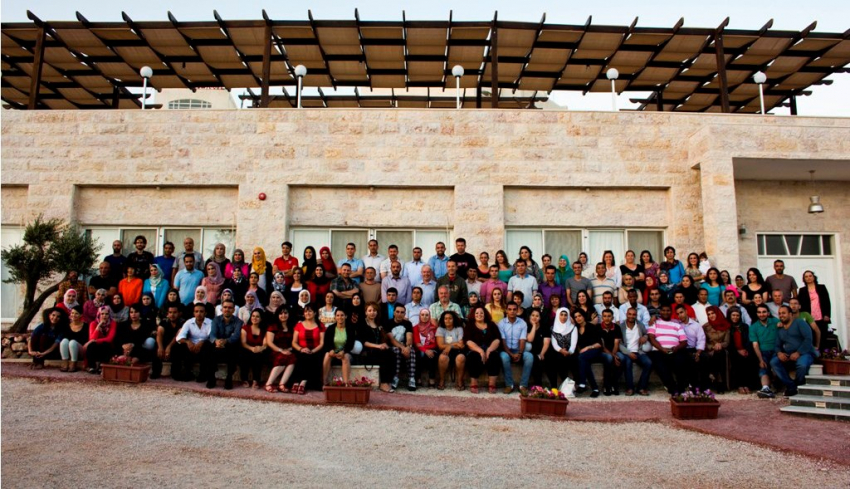
On 12 July, the Qattan Centre for Educational Research and Development (QCERD) concluded activities of the 7th year of the Drama in Education Summer School (DiESS) which was held in the Jordanian city of Jerash. 106 male and female teachers joined from Palestine, Egypt, Syria, Tunisia, Jordan, and Mauritania. The course lecturers and supervisors were from Palestine, Britain, Greece, and Lebanon.
DiESS was launched at the beginning of July this year, giving participating teachers the opportunity to discover ways to use drama as a teaching tool in their classrooms, and showing them how to become engaged with the education process in an integrated way. At the end of the Summer School, teachers who had participated at three different learning levels were awarded certificates.
Wasim Kurdi, QCERD Director, and DiESS Academic Director, said: “the most important questions to ask about the experience are: how does it influence the participants’ thinking, imagination, and the way they view the world? How does it allow them to develop a different perspective on their role as teachers, their view towards the children they teach, and their engagement with their students?”
Kurdi added: “We are thinking, at the Centre, of organising an international conference on drama in education, which will focus both on the theoretical and practical aspects, and for which we will invite experts and those knowledgeable in this field from all over the world. We hope to invite female and male teachers from different countries as well as from Palestine, so that they can share their experiences and learn from one another.”
British Expert Luke Abbott believes the Summer School has had an excellent effect on education, and that there is an increasing interest among teachers in using drama in education. This interest has paved the way for the Summer School to achieve its objectives. Abbott said: “Most of the third year teachers’ questions were about how to apply drama in the classroom within a comprehensive framework.”
Participant Hanan BaniImara from Tunisia said: “this experience has been a unique one. It is the first time I have participated in a specialised course in drama in education. This field is new to Tunisia and is not yet used in schools. Although I have had experiences in the fine arts and theatre, using drama in the classroom is different to anything I have done before.”
Teacher Hatem Mutawi, a first year participant said: “the method of teaching in Summer School lives up to its name—Drama in Education—in as much as we moved from one topic to another in a dramatic way, under the guidance of trainers who are greatly invested in this approach.”
Mutawi added: “we have been shown a clear path towards how to include drama in our teaching. In the first days of the programme the path looked dark, but gradually we progressed towards an understanding of what it means to include drama in education, and the Summer School overall has deepened our levels of comprehension and ability to practice.”
The School in Numbers
This year participating teachers came from the West Bank, Gaza Strip, and the Occupied Palestine of 1948, as well as from other Arab countries including Tunisia, Mauritania, Jordan, Egypt, and Syria. The programme was divided into five courses: three courses in Year 1; one course in Year 2; and one course in Year 3. There were eight lecturers in total, from Palestine, Britain, Greece, and Lebanon. There were also five translators on the team.
Samar Hijjawi, DiESS’s Coordinator, said that the last day was focused around approaches to lesson planning and presentations for the participants, as well as the awarding of certificates. She said: “the Summer School teachers worked together, talked, discussed, and created new ways of teaching.”
